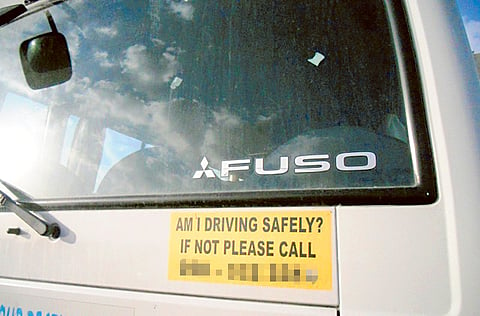Complaining a reckless driver in Dubai
Gulf News tries to call the number specified on the sticker of a bus with a reckless driver. Here's what happened

Dubai: The cream-coloured Japanese-made bus changed lanes suddenly, cutting off a white car and forcing its driver to brake and swerve. Just one incident of countless hundreds on this stretch of Dubai Bypass Road on evening rush hour on Tuesday.
But the bus also has a mandatory sticker, asking ‘How is my driving’ and giving a number to call. The bus is full of mostly sleeping workers, some their heads tilted forward on the seats in front, others dozing blissfully oblivious to the world, its noise blocked out by ear buds and fatigue.
The phone call to the 050 number is greeted by a burst of Pashtun pop that you can copy by pressing the star key. There is no answer.
Traffic is moving well on the road heading towards Sharjah, passing a spot on the other side of the road near the Al Ain Road where, on May 10, 13 workers died when their Jebel Ali-bound bus struck a disabled parked truck on the verge of a hard shoulder, flipped and skidded to a bloody and twisted halt.
None of the sleeping men on the minibus notice the crash site across the road as their driver races at 115km past long and sturdy white buses belonging to construction companies, each filled with their own dozing human cargo, chugging along at a respectable and safe 90km.
A little white lorry loaded high with brown cardboard cartons trundles along, a line of chained and colourful metal decorations jingling in unison. Again, the minibus driver pulls sharply to the left, cutting off the following cars and causing at least two to brake.
Once more, the 050 complaint number is called, this time kicking over to voice mail.
Gulf News pulls level to the bearded driver in a brown kurta. He’s not answering. He’s talking on the phone,


